Grade A, Grade 2, Euro, Winged, Three-Legger, and the dreaded ‘Standard’. The wide variety of names we have for pallet sizes proves there is no such thing as ‘Standard’. So in this blog we decipher the often confusing world of pallet sizing.
Let’s start with ‘Standard’. We’re often asked for ‘Standard sized pallets’ and our response is always to confirm exact sizes, pallet construction and load capacity, as one person’s ‘Standard’ is not necessarily the same as the next. We get so used to the pallet size that we’re most familiar with and could be forgiven for assuming it’s the ‘Standard’ size.
To begin, we’re going to look at the pallet types available in the dimensions that most of our UK domestic customers would call ‘Standard’ size.
Standard UK Size Pallets
Yes, that’s right, while we’ve said there’s no such thing as ‘Standard’, that comes with a caveat. There is a ‘Standard UK’ size which measures 1200x1000mm, as there are ‘Standard’ sizes for other regions of the world. Be aware that ‘UK Standard’ pallets are not the same size as ‘European Standard’ pallets.
The ‘UK Standard’ pallet size comes in many varieties, and the lingo used to name or describe them can vary between pallet companies:
- UK Standard Grade 1 (aka Grade A). Generally speaking these are capable of holding up to approx 1 tonne in weight. The pallet will have big blocks and narrower gaps between the top boards. The top boards will most likely run the short way (1000mm) but sometimes 1200mm top boards will suffice if the timber is thick enough and the blocks big enough. Here at Universal Pallets® we would also define this as being a ‘Perimeter Based Pallet’.
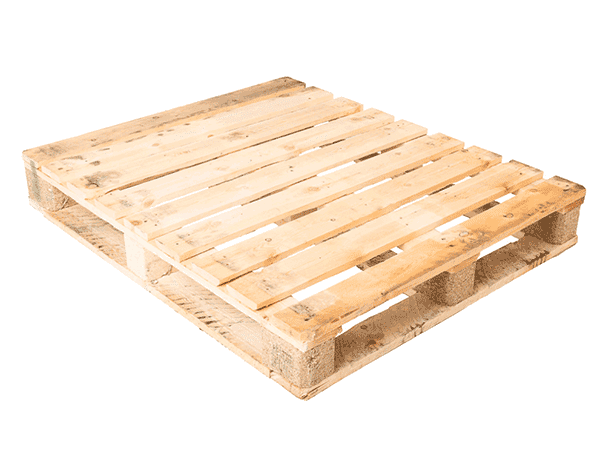
- UK Standard Grade 2 (aka Grade B). This pallet is likely to be able to hold up to approx 750KG but we would advise you to make further enquiries as to the exact spec. Within this range there are a variety of styles available. For example….PB (ie fully perimeter based) with flush base boards, which is usually very important if the pallets are going up in racking. Another variety would be the non-perimeter based (known colloquially as the 3 legger) which doesn’t have any extra base boards. There’s also the ‘conversion’ or ‘Raised’, a 3 legger pallet which has just had extra boards strapped to the bottom for improved stability, but not classed as fully perimeter based and not flush.
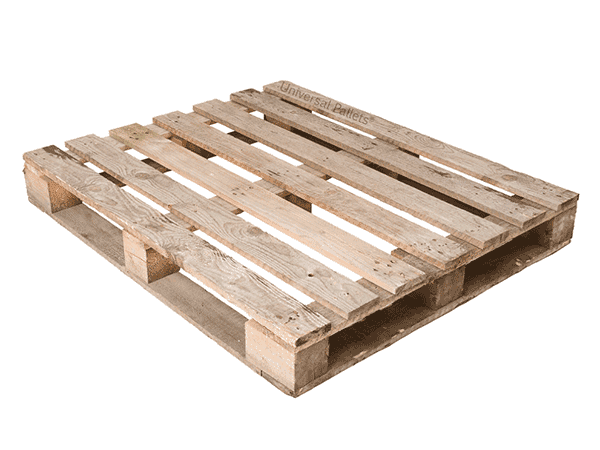
- UK Standard Grade 3 (aka Grade C / Lightweight). These pallets tend to be a mixture of PBs (perimeter based), Conversions and ‘Three Legger’ (see below) depending on what’s in stock but all of which can’t be classed as Grade 1 or 2 because, for example, they are very gappy or the boards and blocks are “skinny”. Load bearing capacity can be anything from as little as 200KG up to approx 500KG.
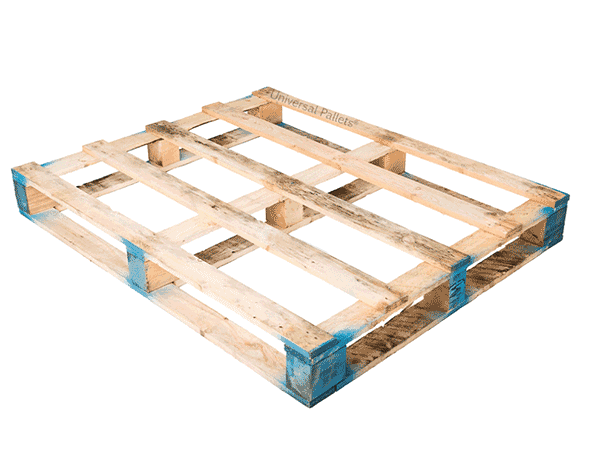
- UK Standard Three-Legger. This means that the pallet does not have any extra boards on the bottom, just the three legs, and this pallet can fall into the grade 2 or grade 3 categories. Take a look at the pictures below to see the difference between the Three Legger and a Conversion, which has extra boards added to the bottom but is not a true Perimeter Based pallet.
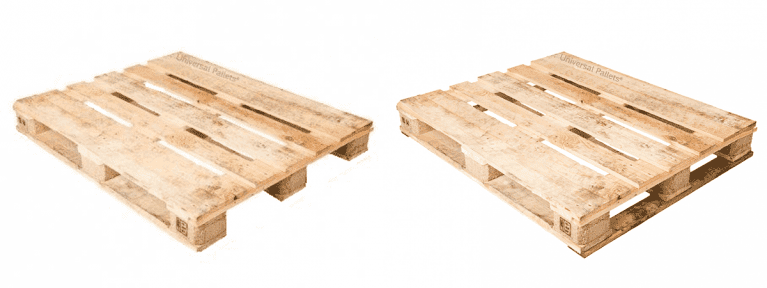
- UK Standard (any grade) Winged. In any of the Grades above you might come across ‘Winged Pallets’, this means that the top boards overhang the blocks like the one in the photo below, usually designed to assist with shrink wrapping or for use in the chemical industry.
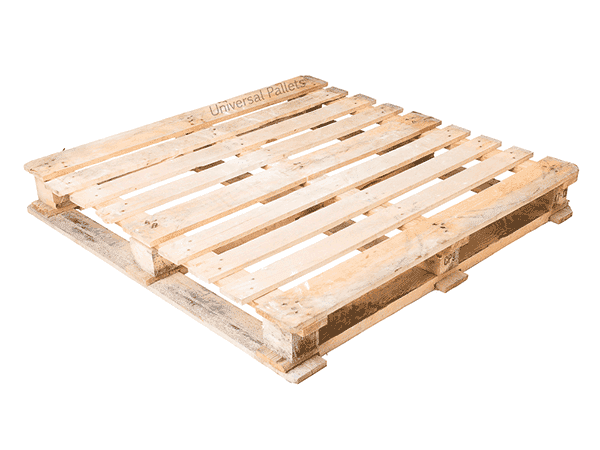
You can view our UK Sized Pallets via this link.
Standard Euro-Size Pallets
And on the continent, they have a slightly different sizing convention. The classic “Euro-sized” pallet size is 1200 x 800mm. In fact, these euro pallets are so common in the UK that often these are the ‘Standard’ pallets our customers are looking for. As a rule of thumb, if your pallets are non-domestic then these are likely the pallets you’ll be using.
There are of course several varieties available such as….
- Stamped Euro
- If a customer asks for a “Stamped Euro” they most likely mean one that has a EUR stamp. This is a heavy duty pallet and was made to specific standard meaning that all pallets bearing the EUR stamp are of identical specification
- In the second-hand industry you can ask for a Grade A (or 1) or Grade B (or 2) Stamped Euro. These will be EUR pallets that are either newer-looking or more weathered in appearance but still great pallets.
- Unstamped Euro
- Also known as unlicensed euro.
- This is just a pallet that measures 1200mm x 800mm. Not all will be identical and none will have the EUR stamp.
- They are likely to vary in load limits depending on the number of topboards, block heights, etc…As such, they tend to fall further into 2 categories – “lightweight” or “medium”.
Euro-size pallets may also have stamps on them to tell you where they were made (ie which brand of EUR pallet they are such as EPAL, UIC, MAV etc) or how they’ve been treated, read our Ultimate Guide To Pallet Markings blog to learn more about pallet markings.
- Half-euro. Sometimes known as the Dussedorf (a true Dussledorf will have metal legs instead of timber blocks), this pallet measures 800mm x 600mm and is exactly half the size of a euro pallet.
Take a look at the EURO pallets we sell via this link.
If you are looking to buy wooden or plastic pallets, then visit our shop. At Universal Pallets we also offer pallet collection and other pallet related services. Get in touch or shop online today!
Global Pallet Sizes
There are 6 ISO approved global pallet sizes available.–If your pallets are likely to travel to every corner of the world, selecting one of these approved sizes could be beneficial and prevent you from having to switch pallets to local sizes at the other end of their journey.
Here’s a nice summary of the 6 most common ones:
- 48×40 inches (1219x1016mm) – most commonly used in North America
- 1200x1000mm – most commonly used across Europe and Asia
- 45.9×45.9 inches (1165x1165mm) – most commonly used in Australia
- 42×42 inches (1067x1067mm) – widely used across North America, Asia and Europe
- 1100x1100mm – most commonly used in Asia
- 1200x800mm – most commonly used across Europe
Square Pallets Sizes
As above with the ISO pallet sizes, you’ll notice that there are a few square pallets used around the world, but not in use so much in the UK and Europe. In North America they frequently use square pallets and different sized square pallets are used in different industries. There are 12 North American Pallet sizes, of which four are square.
Our range of square pallets can be found here.
CP Pallets Sizes
And while there are a variety of other local pallet sizes abroad, we’re going to finish our guide by talking about CP pallets. CP pallets come in a variety of sizes.
Developed in cooperation with the Chemical Industry Association, CP pallets are widely used by the chemical and construction industries, the primary distinguishing factor is their uniformity and strong closely spaced boards. Almost all CP pallets are winged as the board overlap helps to protect the blocks and the integrity of the pallet should any product spill onto the wood. The winged edges also help with shrink-wrapping pallet loads, a method commonly used in the Chemical industry.
There are 9 CP pallet sizes available:
- CP1 – This is a familiarly sized 1200x1000mm Winged pallet.
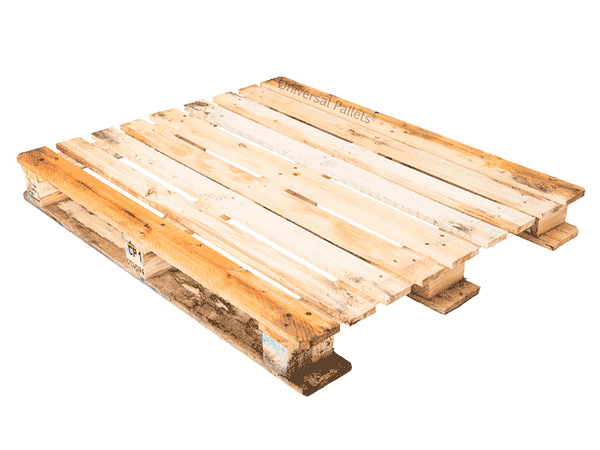
- CP2 – A Euro sized 1200x800mm Winged, Three Legger pallet.
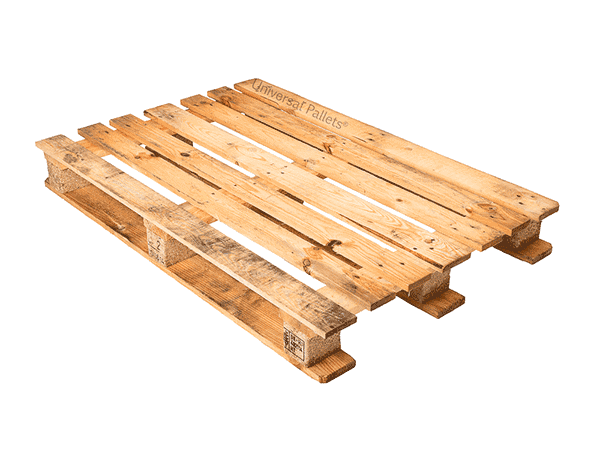
- CP3 – A 1140x1140mm square Winged, Three Legger pallet designed to carry four drums.
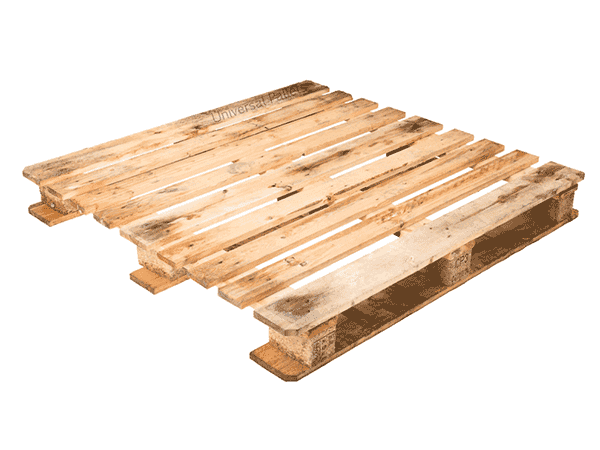
- CP4 – A less familiarly sized 1300x1100mm Winged, Three Legger pallet.
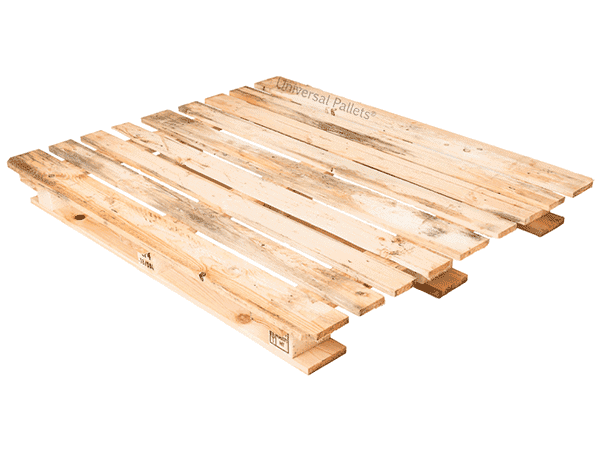
- CP5 – A smaller 1140x760mm Winged, Three Legger pallet, the smallest of the CP pallets.
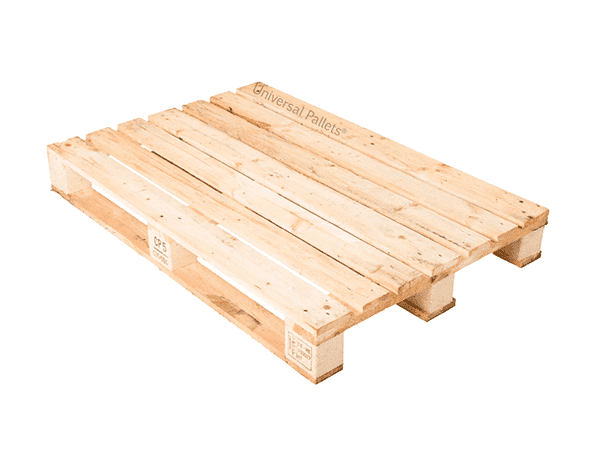
- CP6 – This is a 1200x1000mm Winged pallet with a perimeter base.
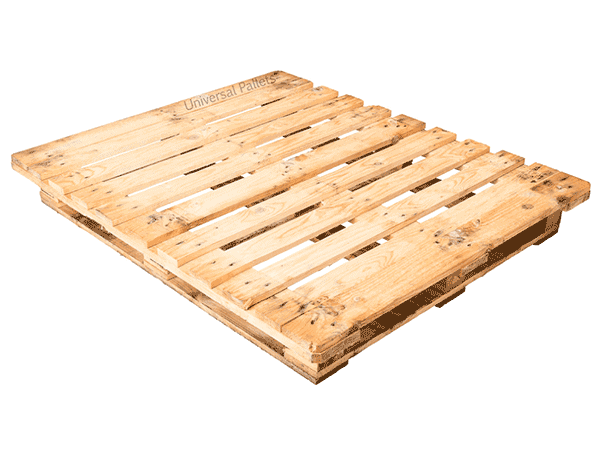
- CP7 – 1300x1100mm Winged pallet with a perimeter base.
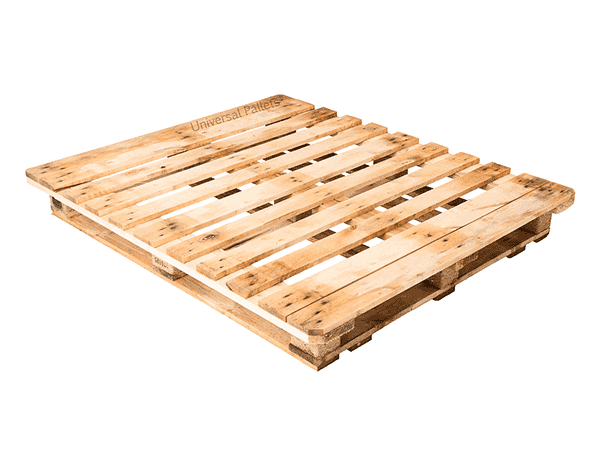
- CP8 – This is a more specialised pallet, 1140×1140 with a hole in the middle designed for bulk bag discharge.
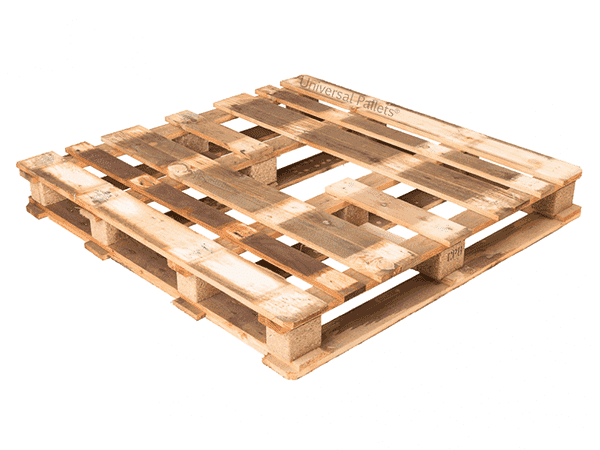
- CP9 – A 1140x1140mm Winged pallet with a perimeter base.
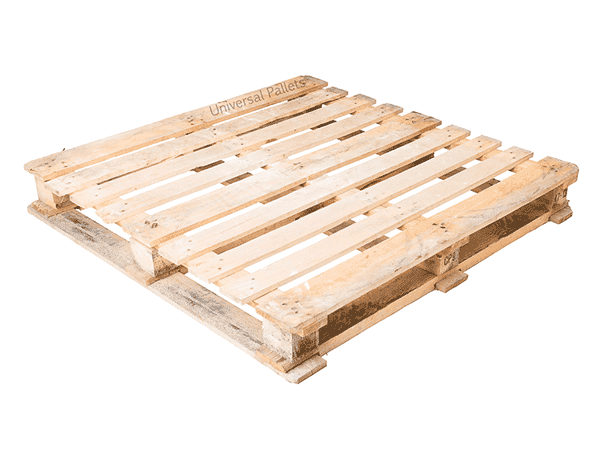
We sell all sizes of CP pallet, find them here.
Custom Pallets Sizes
Sometimes you may find you require a pallet that is custom sized to the space or load weight you need it to bear. In these cases custom pallets can be made to order. If you require a custom sized pallet, call or email our team and we’d be happy to assist and advise you.
The History of Pallet Sizes
We have many of the most common pallet sizes you’re likely to come across, but there are plenty more region specific sizes that we’ve not mentioned. But believe it or not, the world’s pallet sizes are significantly more streamlined than they used to be, thanks to the efforts of regional and global organisations.
In the past, each industry would make pallets for their own purposes, not caring what size the other industries were making theirs.
The more popular sized emerged as a result of common use and trade routes. The European market would transport goods by train, and so made small pallets that would fit into trains and easily fit through doorways, hence 800mm wide (with most doorways in Europe measuring 850mm wide). Trade between the UK and North America was mostly by boat, so their pallets were sized to fit into shipping containers with as little wasted space as possible.
Having more ‘Standard’ pallet sizes across the world has been massively beneficial for trade industries, and while there are still plenty of region-specific and country specific sizes, these are becoming less popular, so we expect the less commonly used sizes will eventually die out.
If you are looking to buy wooden or plastic pallets, then visit our shop. At Universal Pallets we also offer pallet collection and other pallet related services. Get in touch or shop online today!
Download your Quick Guide to Pallet Sizes
We’ve also put together a simple visual guide that explains pallet sizes at styles at a glance. Download your copy here:
